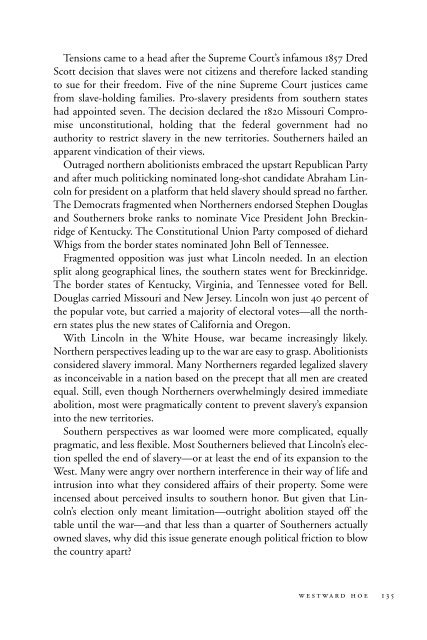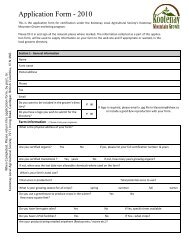Dirt: The Erosion of Civilizations - Kootenay Local Agricultural Society
Dirt: The Erosion of Civilizations - Kootenay Local Agricultural Society
Dirt: The Erosion of Civilizations - Kootenay Local Agricultural Society
Create successful ePaper yourself
Turn your PDF publications into a flip-book with our unique Google optimized e-Paper software.
Tensions came to a head after the Supreme Court’s infamous 1857 Dred<br />
Scott decision that slaves were not citizens and therefore lacked standing<br />
to sue for their freedom. Five <strong>of</strong> the nine Supreme Court justices came<br />
from slave-holding families. Pro-slavery presidents from southern states<br />
had appointed seven. <strong>The</strong> decision declared the 1820 Missouri Compromise<br />
unconstitutional, holding that the federal government had no<br />
authority to restrict slavery in the new territories. Southerners hailed an<br />
apparent vindication <strong>of</strong> their views.<br />
Outraged northern abolitionists embraced the upstart Republican Party<br />
and after much politicking nominated long-shot candidate Abraham Lincoln<br />
for president on a platform that held slavery should spread no farther.<br />
<strong>The</strong> Democrats fragmented when Northerners endorsed Stephen Douglas<br />
and Southerners broke ranks to nominate Vice President John Breckinridge<br />
<strong>of</strong> Kentucky. <strong>The</strong> Constitutional Union Party composed <strong>of</strong> diehard<br />
Whigs from the border states nominated John Bell <strong>of</strong> Tennessee.<br />
Fragmented opposition was just what Lincoln needed. In an election<br />
split along geographical lines, the southern states went for Breckinridge.<br />
<strong>The</strong> border states <strong>of</strong> Kentucky, Virginia, and Tennessee voted for Bell.<br />
Douglas carried Missouri and New Jersey. Lincoln won just 40 percent <strong>of</strong><br />
the popular vote, but carried a majority <strong>of</strong> electoral votes—all the northern<br />
states plus the new states <strong>of</strong> California and Oregon.<br />
With Lincoln in the White House, war became increasingly likely.<br />
Northern perspectives leading up to the war are easy to grasp. Abolitionists<br />
considered slavery immoral. Many Northerners regarded legalized slavery<br />
as inconceivable in a nation based on the precept that all men are created<br />
equal. Still, even though Northerners overwhelmingly desired immediate<br />
abolition, most were pragmatically content to prevent slavery’s expansion<br />
into the new territories.<br />
Southern perspectives as war loomed were more complicated, equally<br />
pragmatic, and less flexible. Most Southerners believed that Lincoln’s election<br />
spelled the end <strong>of</strong> slavery—or at least the end <strong>of</strong> its expansion to the<br />
West. Many were angry over northern interference in their way <strong>of</strong> life and<br />
intrusion into what they considered affairs <strong>of</strong> their property. Some were<br />
incensed about perceived insults to southern honor. But given that Lincoln’s<br />
election only meant limitation—outright abolition stayed <strong>of</strong>f the<br />
table until the war—and that less than a quarter <strong>of</strong> Southerners actually<br />
owned slaves, why did this issue generate enough political friction to blow<br />
the country apart?<br />
w estward hoe 135






